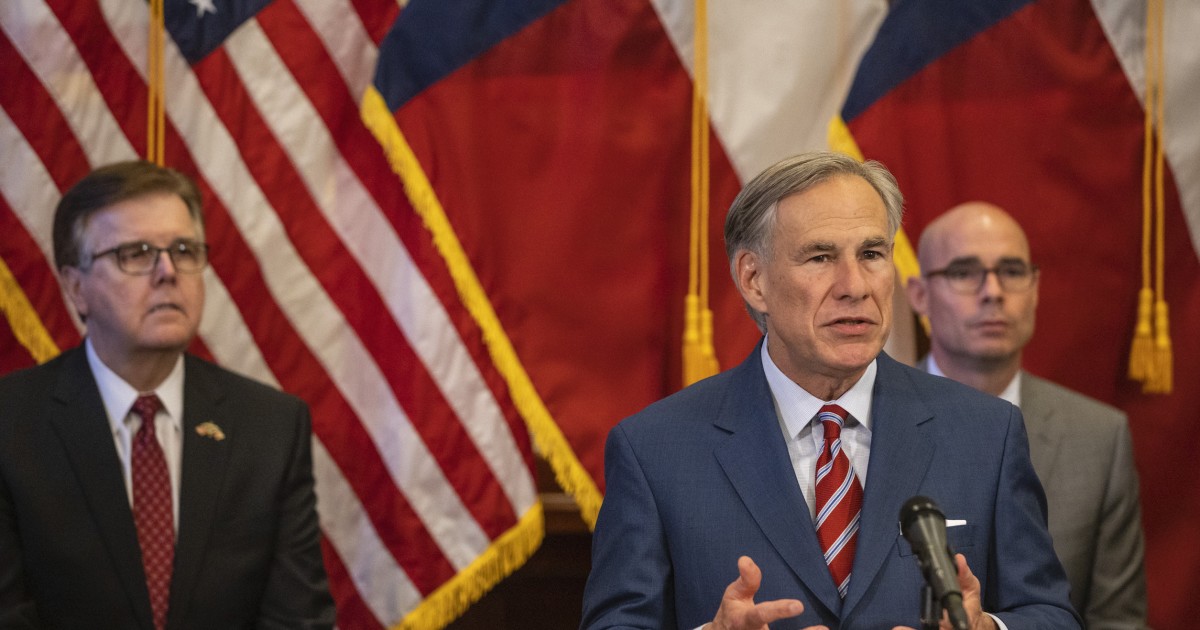
The number of new coronavirus cases and hospitalizations has increased in Texas and several states in the South and West, leading governors to eye more aggressive responses.
Texas Gov. Greg Abbott said Monday that increased rates in hospitalizations and record daily highs of new coronavirus cases show that “COVID-19 is now spreading at an unacceptable rate in Texas, and it must be corralled.”
He pleaded with Texans to wear masks but stopped short of mandating mask-wearing, as California Gov. Gavin Newsom did last week.
If numbers of cases and hospitalizations double next month, he said, “That would mean that we are in an urgent situation where tougher actions will be required to make sure that we do contain the spread of COVID-19.”
Abbott did not say what kinds of restrictions were under consideration, but said, “Closing down Texas again will always be the last option.”
The rate of new positive tests in Texas has surpassed 10%, according to research published by COVID Exit Strategy.
Cases and hospitalizations have spiked in recent weeks, primarily in Southern and Western states. California, Texas, and Florida have each reported over 22,000 new cases of the coronavirus since June 15, according to the Washington Post. Arizona, which has seen the sharpest increase in new cases since the start of June, reported another record day for COVID-19 hospitalizations Monday. South Carolina has also emerged as a new hot spot for the coronavirus.
The number of coronavirus cases across the United States has reached 2.3 million. At least 120,300 people have died.
White House press secretary Kayleigh McEnany told reporters Monday that President Trump’s comment at a rally over the weekend that he’d told aides to slow down coronavirus testing was made “in jest.”
“Any suggestion that testing has been curtailed is not rooted in fact,” McEnany said. She justified his remarks by saying that the media has only focused on drastic increases in new cases without explaining that testing has become more widely available. Yet, some of the states that have seen rising reported cases of COVID-19 have also seen increasing rates of positive tests.
At his Tulsa rally Saturday, Trump said, “When you do testing to that extent, you’re gonna find more people, you’re gonna find more cases. So I said to my people, ‘Slow the testing down, please.’”
White House economic adviser Larry Kudlow said Monday that, despite the coronavirus case increases in over 20 states, “there is no second wave coming.” He added that lawmakers will likely develop another fiscal relief package by the end of next month.
“It’s just hot spots,” Kudlow said on CNBC. “They send in [Centers for Disease Control and Prevention] teams, we’ve got the testing procedures, we’ve got the diagnostics, we’ve got the PPE. And so, I really think it’s a pretty good situation.”
The World Health Organization said that most of the global rise in coronavirus cases is not due to increased testing.
“Some of that increase may be attributed to increased testing … but we do not believe this is a testing phenomenon,” said Michael Ryan, executive director of the WHO Emergencies Program. “Hospital admissions are also rising in a number of countries. Deaths are also rising. They’re not due to increased testing, per se.”
Ryan attributed the rise in cases to growing infections in heavily populated countries and to the spread of the virus globally.
“The numbers are increasing because the epidemic is developing in a number of populous countries at the same time and [in] a large number of countries across the whole world,” he said.
Over the weekend, the world saw the largest increase yet in coronavirus cases, according to the organization.
By late Sunday, the WHO tallied more than 183,000 new cases over the previous 24 hours. Brazil saw the biggest increase, 54,771. The U.S. was next at 36,617, and India was third with 15,400. Multiple factors are causing the surge in new cases, including increased testing and spreading infections.
Two members of a campaign advance team who attended Trump’s Saturday rally have tested positive for the coronavirus, CNBC reported Monday. The tally of advance team members for the rally who have tested positive for COVID-19 is up to eight. The other six team members who tested positive found out before the event and, therefore, didn’t attend.
Saudi Arabia will shrink this year’s hajj pilgrimage, which usually draws millions of Muslims to the holiest site in Islam, the Kaaba mosque, amid concerns about the spread of COVID-19.
The annual pilgrimage to Mecca, which starts in July and usually lasts five days, will be restricted to a very limited number of pilgrims who are already residing in Saudi Arabia, the Wall Street Journal reported Monday.
Trump is suspending five classes of immigrant visas through the end of the year in an effort to open more than a half-million jobs to people in the U.S., according to three senior administration officials. He will extend the 60-day halt on new visas that he issued on April 22 for incoming green-card recipients or those who have been approved to live and work in the U.S. as permanent legal residents. His order will bar most other categories of applicants. In all, the visas being suspended would prevent approximately 525,000 immigrants from entering the U.S. through the end of 2020.
“That is being extended to the end of the year, and the president is expanding that measure in light of the, frankly, the expanding unemployment and the number of Americans out of work,” a senior administration official told reporters Monday.
After months of lockdowns and restrictions on commerce, the U.S. has begun reopening the economy to repair severe economic damage. The unemployment rate skyrocketed early in the pandemic but rallied in May since the economy gained 2.5 million jobs, lowering the unemployment rate to 13.3%, from 14.7% in April.
